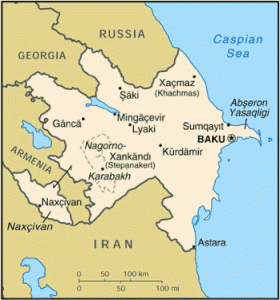Tom Arnold
The UAE is looking to Azerbaijan to increase its food security as the two countries signed an agreement that helps pave the way for co-operation in both farming and industry.
The central Asian country has a rich variety of agricultural resources in which the UAE might invest, said Sultan al Mansouri, the Minister of Economy.
“We looked at what the demands and needs of the UAE are,” he said.
Geography also plays a role. “We see investment (opportunities) in the agricultural sector because of the relatively small distance between the UAE and Azerbaijan.”.
The UAE is Azerbaijan’s leading trading partner in the Arab world. And like the Emirates, the former Soviet state holds extensive reserves of oil and gas which have helped drive its growth.
A high-ranking delegation from the country has spent the past two days in Abu Dhabi meeting officials from the Ministry of Economy, which culminated in a trade and investment accord that also spans oil and industry.
Azerbaijan has vast swathes of agricultural land and its leading products are cotton, rice, grain and grapes. Almost 40 per cent of the country’s labour force works in agriculture.
The UAE also wants to take advantage of Azerbaijan’s location to further its ambitions of easing its dependence on petroleum and becoming a major industrial player by establishing industry in Iran’s northern neighbour.
“We see industries to be established in a joint venture in Azerbaijan to serve the area of Central Asia, eastern Europe and Russia,” said Mr al Mansouri.
“It’s part of a very important strategy for us to establish and strengthen the position of our industries in that region.”
Exchanging expertise on hydrocarbons including oil projects was also a key part of the agreement, Mr al Mansouri said.
Identifying domestic products that could be exported between the two countries was another cornerstone of the agreement, he said.
In addition, he said Azerbaijan remained keen to learn from the UAE in the development of its tourism and aviation sectors.
Bilateral trade grew by 22 per cent to US$245 million (Dh899.9m) last year, from $200m in 2004, including fuel oil, chemicals, electric devices, iron and steel products.
As the UAE looks to diversify its sources of foodstuffs as a hedge against price increases and supply disruptions, plans are already in process to invest in farmland in Pakistan, Sudan and Cambodia. Surging costs of food imports helped power high inflation in the years before the financial crisis took hold.
Rice, flour, meat, tea, coffee and oil are among the basic commodities the UAE imports. The country imports about 85 per cent of its food at an estimated cost of Dh10.64 billion a year.
In October, Mr al Mansouri led a delegation from the Ministry of Economy to Cambodia to explore producing products such as rice, soya, beans and meat.
Last year, the UAE started talks with Pakistan to invest up to $500m in its farming sector. Abu Dhabi acquired 30,000 hectares of land in Sudan to grow alfalfa, which is used to feed cattle, and other crops such as corn.
[email protected]












